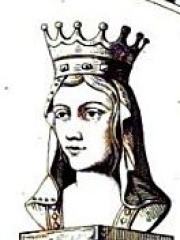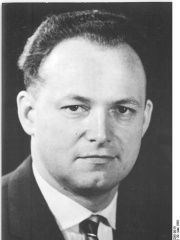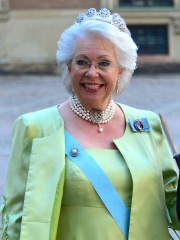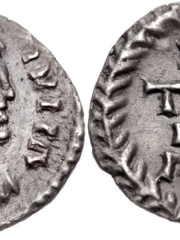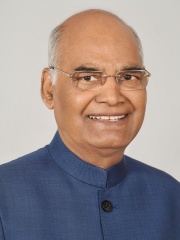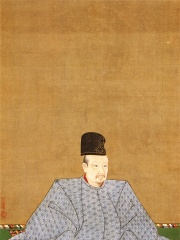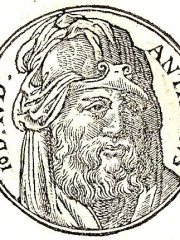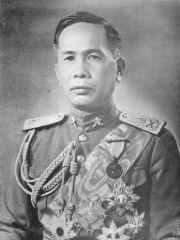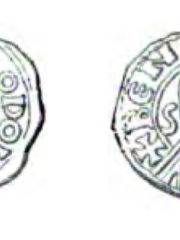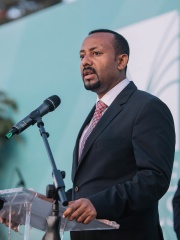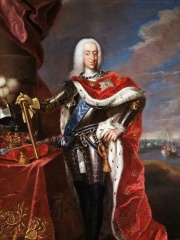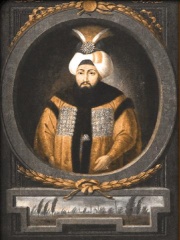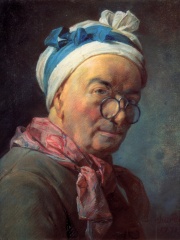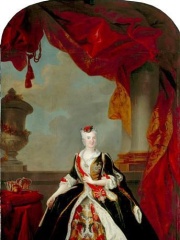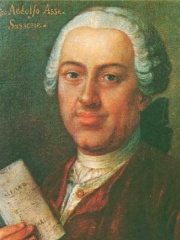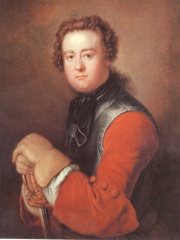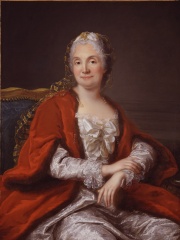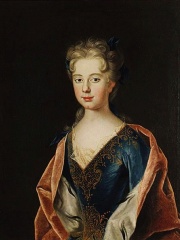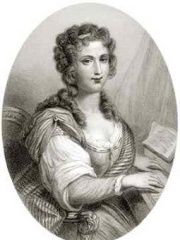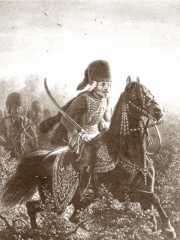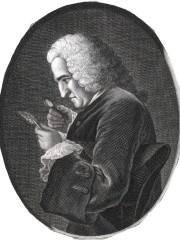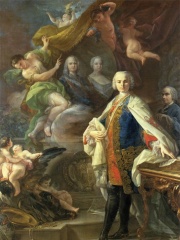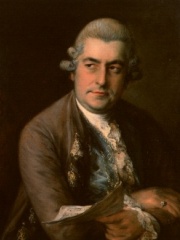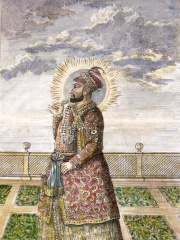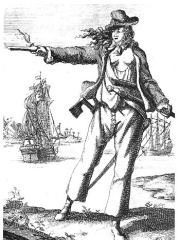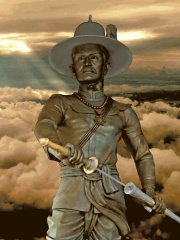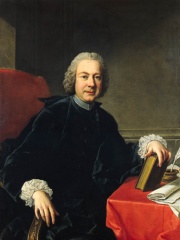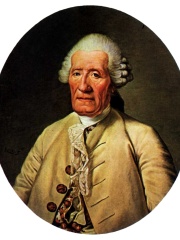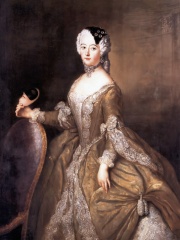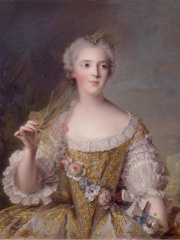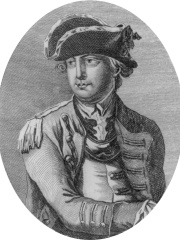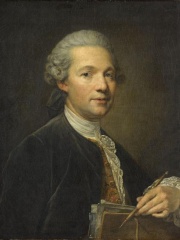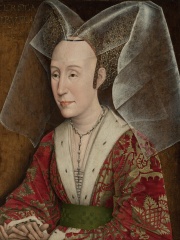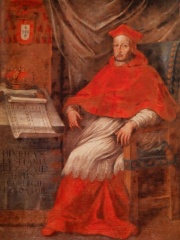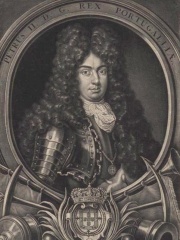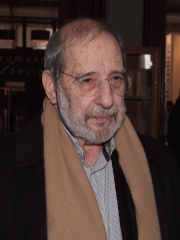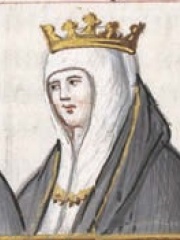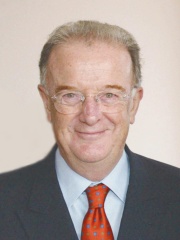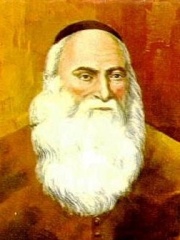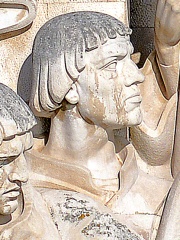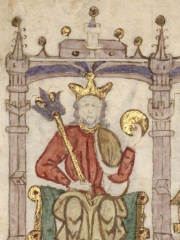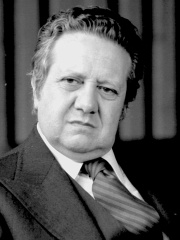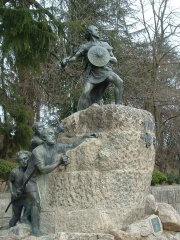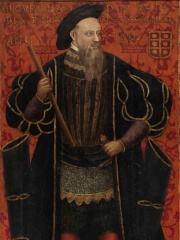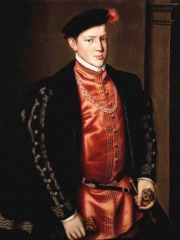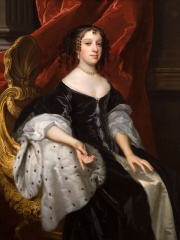POLITICIAN
Sebastião José de Carvalho e Melo, 1st Marquis of Pombal
1699 - 1782
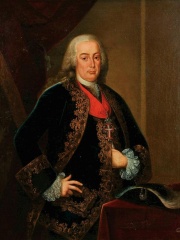
 Sebastião José de Carvalho e Melo, 1st Marquis of Pombal
Sebastião José de Carvalho e Melo, 1st Marquis of Pombal
D. Sebastião José de Carvalho e Melo, 1st Marquis of Pombal and 1st Count of Oeiras (13 May 1699 – 8 May 1782), known as the Marquis of Pombal (Portuguese: Marquês de Pombal [mɐɾˈkeʒ ðɨ põˈbal]), was a Portuguese statesman and diplomat who despotically ruled the Portuguese Empire from 1750 to 1777 as chief minister to King Joseph I. A strong advocate for absolutism, and influenced by some of the ideals of the Age of Enlightenment, Pombal led Portugal's recovery from the 1755 Lisbon earthquake and reformed the kingdom's administrative, economic, and ecclesiastical institutions. During his lengthy ministerial career, Pombal accumulated and exercised autocratic power, curtailing individual liberties, suppressing political opposition, and fostering the Atlantic slave trade to Brazil. Read more on Wikipedia
His biography is available in 36 different languages on Wikipedia (up from 35 in 2024). Sebastião José de Carvalho e Melo, 1st Marquis of Pombal is the 2,797th most popular politician (down from 2,140th in 2024), the 68th most popular biography from Portugal (down from 53rd in 2019) and the 40th most popular Portuguese Politician.
Sebastião José de Carvalho e Melo, 1st Marquis of Pombal, was a Portuguese statesman who was the effective ruler of Portugal from 1750 to 1777. His policies have been characterized as enlightened despotism. He was responsible for the destruction of the power of the aristocracy, and for significant economic development.
Memorability Metrics
Page views of Sebastião José de Carvalho e Melo, 1st Marquis of Pombal by language
Among POLITICIANS
Among politicians, Sebastião José de Carvalho e Melo, 1st Marquis of Pombal ranks 2,797 out of 19,576. Before him are Zhenjin, Adelaide of Maurienne, Manfred Gerlach, Princess Christina, Mrs. Magnuson, Teia, and Ram Nath Kovind. After him are Greg Abbott, Emperor Go-Yōzei, Antigonus II Mattathias, Plaek Phibunsongkhram, Louis the Blind, and Abiy Ahmed.
Most Popular Politicians in Wikipedia
Go to all RankingsZhenjin
1243 - 1286
HPI: 70.18
Rank: 2,792
Adelaide of Maurienne
1092 - 1154
HPI: 70.17
Rank: 2,793
Manfred Gerlach
1928 - 2011
HPI: 70.17
Rank: 2,794
Princess Christina, Mrs. Magnuson
1943 - Present
HPI: 70.16
Rank: 2,795
Teia
550 - 552
HPI: 70.16
Rank: 2,796
Ram Nath Kovind
1945 - Present
HPI: 70.16
Rank: 2,797
Sebastião José de Carvalho e Melo, 1st Marquis of Pombal
1699 - 1782
HPI: 70.16
Rank: 2,798
Greg Abbott
1957 - Present
HPI: 70.16
Rank: 2,799
Emperor Go-Yōzei
1571 - 1617
HPI: 70.16
Rank: 2,800
Antigonus II Mattathias
100 BC - 37 BC
HPI: 70.15
Rank: 2,801
Plaek Phibunsongkhram
1897 - 1964
HPI: 70.15
Rank: 2,802
Louis the Blind
880 - 928
HPI: 70.15
Rank: 2,803
Abiy Ahmed
1976 - Present
HPI: 70.15
Rank: 2,804
Contemporaries
Among people born in 1699, Sebastião José de Carvalho e Melo, 1st Marquis of Pombal ranks 5. Before him are Christian VI of Denmark, Osman III, Jean-Baptiste-Siméon Chardin, and Maria Josepha of Austria. After him are Johann Adolph Hasse, Georg Wenzeslaus von Knobelsdorff, Marie Thérèse Rodet Geoffrin, Anna Leszczyńska, Françoise-Louise de Warens, Hans Joachim von Zieten, and Bernard de Jussieu. Among people deceased in 1782, Sebastião José de Carvalho e Melo, 1st Marquis of Pombal ranks 8. Before him are Farinelli, Johann Christian Bach, Hyder Ali, Anne Bonny, Taksin, and Pietro Metastasio. After him are Jacques de Vaucanson, Louisa Ulrika of Prussia, Anna Göldi, Sophie of France, Charles Lee, and Ange-Jacques Gabriel.
Others Born in 1699
Go to all RankingsChristian VI of Denmark
POLITICIAN
1699 - 1746
HPI: 77.47
Rank: 1
Osman III
POLITICIAN
1699 - 1757
HPI: 76.91
Rank: 2
Jean-Baptiste-Siméon Chardin
PAINTER
1699 - 1779
HPI: 75.45
Rank: 3
Maria Josepha of Austria
POLITICIAN
1699 - 1757
HPI: 72.08
Rank: 4
Sebastião José de Carvalho e Melo, 1st Marquis of Pombal
POLITICIAN
1699 - 1782
HPI: 70.16
Rank: 5
Johann Adolph Hasse
COMPOSER
1699 - 1783
HPI: 70.14
Rank: 6
Georg Wenzeslaus von Knobelsdorff
ARCHITECT
1699 - 1753
HPI: 64.74
Rank: 7
Marie Thérèse Rodet Geoffrin
POLITICIAN
1699 - 1777
HPI: 64.25
Rank: 8
Anna Leszczyńska
POLITICIAN
1699 - 1717
HPI: 62.49
Rank: 9
Françoise-Louise de Warens
NOBLEMAN
1699 - 1762
HPI: 62.36
Rank: 10
Hans Joachim von Zieten
MILITARY PERSONNEL
1699 - 1786
HPI: 60.84
Rank: 11
Bernard de Jussieu
PHYSICIAN
1699 - 1777
HPI: 60.45
Rank: 12
Others Deceased in 1782
Go to all RankingsFarinelli
SINGER
1705 - 1782
HPI: 77.22
Rank: 2
Johann Christian Bach
COMPOSER
1735 - 1782
HPI: 77.07
Rank: 3
Hyder Ali
POLITICIAN
1720 - 1782
HPI: 75.03
Rank: 4
Anne Bonny
PIRATE
1702 - 1782
HPI: 73.41
Rank: 5
Taksin
POLITICIAN
1734 - 1782
HPI: 71.99
Rank: 6
Pietro Metastasio
WRITER
1698 - 1782
HPI: 70.79
Rank: 7
Sebastião José de Carvalho e Melo, 1st Marquis of Pombal
POLITICIAN
1699 - 1782
HPI: 70.16
Rank: 8
Jacques de Vaucanson
INVENTOR
1709 - 1782
HPI: 69.48
Rank: 9
Louisa Ulrika of Prussia
COMPANION
1720 - 1782
HPI: 69.22
Rank: 10
Anna Göldi
RELIGIOUS FIGURE
1734 - 1782
HPI: 68.54
Rank: 11
Sophie of France
COMPANION
1734 - 1782
HPI: 68.44
Rank: 12
Charles Lee
MILITARY PERSONNEL
1731 - 1782
HPI: 68.43
Rank: 13
Ange-Jacques Gabriel
ARCHITECT
1698 - 1782
HPI: 67.32
Rank: 14
In Portugal
Among people born in Portugal, Sebastião José de Carvalho e Melo, 1st Marquis of Pombal ranks 68 out of 633. Before him are Eleanor of Portugal, Holy Roman Empress (1434), Isabella of Portugal, Duchess of Burgundy (1397), Henry, King of Portugal (1512), Peter II of Portugal (1648), Álvaro Siza Vieira (1933), and Isabella of Portugal, Queen of Castile (1428). After him are Jorge Sampaio (1939), Uriel da Costa (1585), Isaac Abarbanel (1437), Pêro da Covilhã (1450), Carmen Miranda (1909), and Sancho II of Portugal (1209).
Others born in Portugal
Go to all RankingsEleanor of Portugal, Holy Roman Empress
POLITICIAN
1434 - 1467
HPI: 70.99
Rank: 62
Isabella of Portugal, Duchess of Burgundy
POLITICIAN
1397 - 1471
HPI: 70.93
Rank: 63
Henry, King of Portugal
POLITICIAN
1512 - 1580
HPI: 70.89
Rank: 64
Peter II of Portugal
POLITICIAN
1648 - 1706
HPI: 70.89
Rank: 65
Álvaro Siza Vieira
ARCHITECT
1933 - Present
HPI: 70.83
Rank: 66
Isabella of Portugal, Queen of Castile
COMPANION
1428 - 1496
HPI: 70.40
Rank: 67
Sebastião José de Carvalho e Melo, 1st Marquis of Pombal
POLITICIAN
1699 - 1782
HPI: 70.16
Rank: 68
Jorge Sampaio
POLITICIAN
1939 - 2021
HPI: 70.02
Rank: 69
Uriel da Costa
PHILOSOPHER
1585 - 1640
HPI: 70.00
Rank: 70
Isaac Abarbanel
PHILOSOPHER
1437 - 1508
HPI: 69.94
Rank: 71
Pêro da Covilhã
EXPLORER
1450 - 1530
HPI: 69.90
Rank: 72
Carmen Miranda
SINGER
1909 - 1955
HPI: 69.74
Rank: 73
Sancho II of Portugal
POLITICIAN
1209 - 1248
HPI: 69.70
Rank: 74
Among POLITICIANS In Portugal
Among politicians born in Portugal, Sebastião José de Carvalho e Melo, 1st Marquis of Pombal ranks 40. Before him are Mário Soares (1924), Afonso VI of Portugal (1643), Eleanor of Portugal, Holy Roman Empress (1434), Isabella of Portugal, Duchess of Burgundy (1397), Henry, King of Portugal (1512), and Peter II of Portugal (1648). After him are Jorge Sampaio (1939), Sancho II of Portugal (1209), Viriathus (-180), Francisco de Almeida (1450), João Manuel, Prince of Portugal (1537), and Catherine of Braganza (1638).
Mário Soares
1924 - 2017
HPI: 71.55
Rank: 34
Afonso VI of Portugal
1643 - 1683
HPI: 71.16
Rank: 35
Eleanor of Portugal, Holy Roman Empress
1434 - 1467
HPI: 70.99
Rank: 36
Isabella of Portugal, Duchess of Burgundy
1397 - 1471
HPI: 70.93
Rank: 37
Henry, King of Portugal
1512 - 1580
HPI: 70.89
Rank: 38
Peter II of Portugal
1648 - 1706
HPI: 70.89
Rank: 39
Sebastião José de Carvalho e Melo, 1st Marquis of Pombal
1699 - 1782
HPI: 70.16
Rank: 40
Jorge Sampaio
1939 - 2021
HPI: 70.02
Rank: 41
Sancho II of Portugal
1209 - 1248
HPI: 69.70
Rank: 42
Viriathus
180 BC - 139 BC
HPI: 69.43
Rank: 43
Francisco de Almeida
1450 - 1510
HPI: 69.31
Rank: 44
João Manuel, Prince of Portugal
1537 - 1554
HPI: 69.26
Rank: 45
Catherine of Braganza
1638 - 1705
HPI: 68.93
Rank: 46

